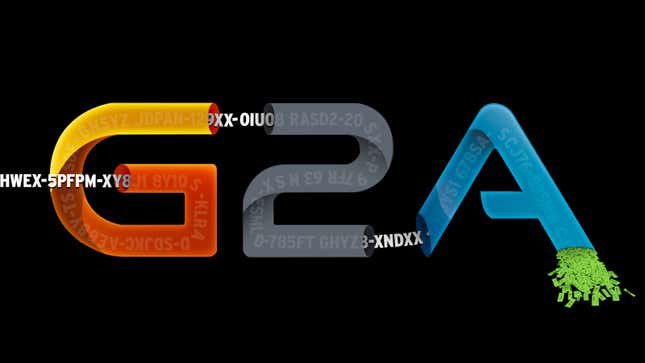
There’s a few reasons you might have heard of G2A, one of the Internet’s most popular spots to sell an extra Steam key. One, it’s been the subject of intense criticism for not doing enough about fraud. Two, you can’t watch a YouTube video or a Twitch stream without running into someone who’s taking money to promote them. From PewDiePie down, G2A is everywhere.
G2A is not the only key-selling marketplace on the Internet, but it has locked up many of the Internet’s most popular personalities, who include links to G2A on their videos and streams.
Few advertisers seem to divide streamers more than G2A. And when I went looking for people to speak with about what goes into picking and choosing advertisers to partner with, emails to video creators currently partnered with G2A went unanswered. I regularly heard back from those who’d moved on, folks who often had pointed and passionate feelings about the company.
“[They’ve] always been shady in my eyes,” said a popular streamer, who asked to remain anonymous and has explicitly decided to never run ads by G2A. “With streaming, there’s a question of morality everyone has to make. Do you want to just say, ‘Fuck it,’ and say yes to every sponsor, or do you want to have some morality in what you do?”
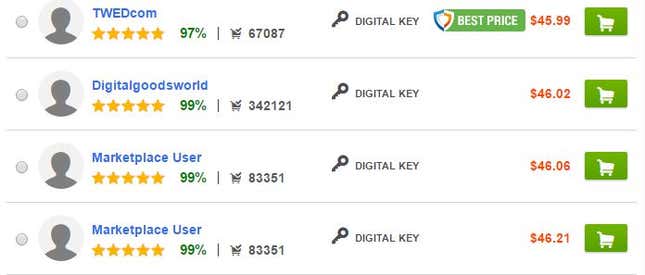
It’s understandable why a lot of people who play video games like G2A: cheap prices. Overwatch: Origins Edition costs $59.99 through Blizzard, but it’s as low as $46 on G2A. It’s cheaper because individuals are selling the keys, not Blizzard. But it also means you don’t know where the keys came from. Did someone simply have an extra key, or did they use stolen credit cards to defraud a game developer? There’s no way to know, and unlike other prominent marketplaces, G2A doesn’t automatically provide consumers with insurance for their purchases. To get covered, you need to pay for a $1 per month service called G2A Shield. All of this has created an air of distrust around the popular marketplace.
“We welcome this opportunity to further educate people on G2A,” said a company spokesperson to Kotaku over email, “what we have to offer and the tools we have in place to ensure a safe and secure marketplace experience. G2A is open [sic] appreciates and welcomes input and feedback from buyers and sellers in the marketplace—we listen and want to make the G2A marketplace better each day. We invite those people to meet us, and maintain an open door attitude for co-operation.”
On the company’s website, G2A boasts about a number of high-profile YouTube and Twitch partners:
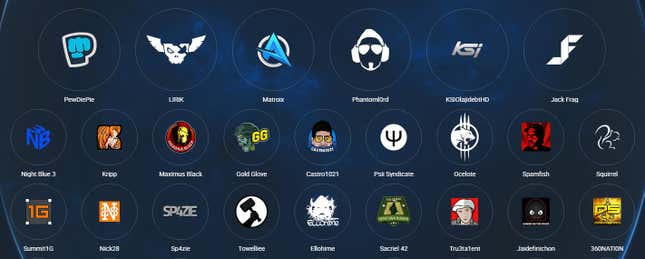
- PewDiePie: 46 million subscribers on YouTube
- Lirik: 1.4 million followers on Twitch
- Matroix: 8.3 million subscribers on one YouTube channel, 3.5 million on another.
- PhantomL0rd: 1.4 million followers on Twitch. (He was recently banned over the Counter-Strike ongoing gambling scandal, but at the time, was still promoting G2A.)
- KSIOlajidebtHD: 4.4 million subscribers on YouTube
- JackFrags: 1.7 million subscribers on YouTube
PewDiePie is far and away the most popular video personality on YouTube, Twitch, or otherwise. Several of PewDiePie’s most recent videos have a G2A promotion to win a gift card. When asked about how he chooses his promotions, PewDiePie declined to comment. I contacted more than a dozen video creators currently running G2A promotions, but my questions went unanswered.
In the last month or so, however, two heavy-hitters—JackFrags and LIRIK—have dropped G2A for various reasons. One of those heavy-hitters cited a recent string of controversies surrounding the key retailer.
“G2A is working successfully with over 500 partners including 70 e-Sport teams and 100 events,” a G2A spokesperson told me over email. “A few partners, ten in total, took a break, some to renegotiate their contracts, some for various other reasons. The real story here however is that 490 partners chose to stick with us.”
Update 6:35pm: Some video creators seen and featured on G2a’s website—including Spamfish—have informed me they’re no longer partnered with the company.
JackFrags didn’t publicly comment on why he was moving away from G2A, only saying he was “parting ways” in the next month. LIRIK was more explicit during one of his streams.
“I’ve been with them for a long time, because they were fucking cool-ass people, and everything worked out,” said LIRIK in a somewhat rambling explanation on Twitch about moving on from G2A. “I kept chilling with them and never changed it up. As you guys know, some...stuff happened. There’s so much news. There’s been like 10 different things that happened this week.”
That “stuff” was a public fight that indie developer TinyBuild picked with G2A in late June. The Punch Club studio published a blog alleging the so-called eBay of game keys was “facilitating a fraud-fueled economy.” TinyBuild argued G2A made it easy to sell fraudulent keys obtained with stolen credit cards. In a story last week, I outlined how a hacker allegedly used stolen credit cards to run off with keys that he quickly turned into hundreds of dollars by selling them through G2A.
While G2A admitted it was working on providing new tools for developers concerned about fraud, the company pointed to ongoing security issues with developer payment processors—the financial institutions that handle online transactions—as an important issue that had little to do with them. G2A itself isn’t committing the alleged fraud; the concern is how easy their business model can make it to profit off fraud committed elsewhere.
“We’d like to be clear that the origin of fraud is not theft of the game codes themselves, but rather stolen credit cards used to purchase codes,” said a G2A spokesperson.
What really turned heads was an influential late June video about G2A from LevelCapGaming called “Den of Thieves.” It is a 15-minute scathing critique outlining the fraud allegations against G2A and what the company has done to push back. It may not be new to anyone who’s been following the G2A story already, but for many, it was revelatory. Part of what makes the video unique is the aggressive and downright accusatory description of G2A’s practices, likening the company to being the getaway driver during a bank heist.
In the days after LevelCapGaming’s video was published, JackFrags and LIRIK dropped G2A. Neither responded to my request for comment, but LevelCapGaming, aka Charlie Goldberg, did.
“I blame a lot of YouTubers–myself included–for massive brand integration of G2A,” said Goldberg. “We helped create a brand that gamers associate with cheap legitimate games. Too many of us are young and easily swayed by money. We don’t have managers or a team of people seeking out advertising deals. It’s just us.”
Goldberg used to partner with G2A, too, and cited PewDiePie being on-board as one of the primary reasons he joined up. PewDiePie’s name meant legitimacy. “That had a large impact for me personally since I have always associated PewDiePie with being a decent guy,” he said.
Choosing to partner with G2A doesn’t mean PewDiePie is suddenly not a decent guy, though. It’s understandable why so many choose to partner with G2A: it turns a decent profit for the video creator and the viewer can buy games for cheap. That sounds like a win-win situation, and given that G2A sells plenty of legitimate keys, too, it’d be unfair to say the service isn’t without positives. Ultimately, it’s providing a service for people who want to pay for games, not pirate them.
How much a video creator makes off G2A varies, depending on two variables: popularity and their ability to push viewers to use a unique referral code. A smaller streamer—we’re talking in the hundreds of thousands of subscribers—told me they were offered $400 per month, which was compelling because it could “pay various bills in a household, so it’s one less headache.”
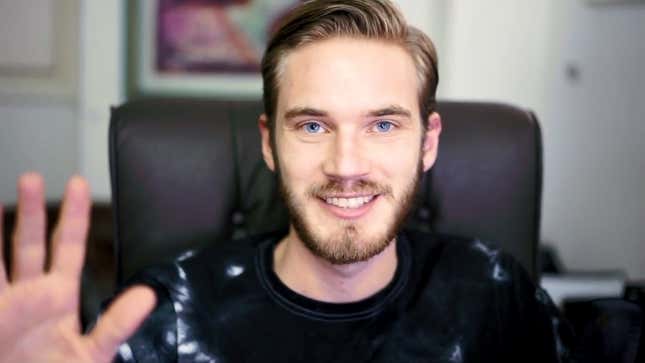
A larger streamer, pulling in millions of viewers, briefly partnered with G2A and was guaranteed $1,500 per month and, on average, made another $1,500-$2,000 from their referral code.
“This income would have grown exponentially had I stayed with them longer or promoted them harder,” said the anonymous streamer. “Four video mentions a month and four social posts is all it took to get that much money coming in and those who promoted harder earned more.”
It’s easy to see how that money might scale with video creators commanding tens of millions of viewers.
Pushing back on G2A isn’t new, and other voices have been saying it for a while. So far as I can tell, no other advertising partner has caused as much division among creators as G2A.
“I’m ending my partnership with G2A due to the confusion and controversy over their Marketplace system,” said streamer Cohh Carnage in 2015. “Our dropping of G2A does not reflect on other streamers. Good friends of mine still use G2A.”
And it’s not like consumers are running away, either; G2A says they’re still growing rapidly.
“We are always looking to improve our processes,” said the company in a statement. “Every day we get better. Every day we get faster. Every day we serve more customers. Every month 250,000 new customers arrive on the G2A Marketplace.”
While reporting this story, I found it difficult to get streamers on the record defending G2A.
“G2A and their ilk are unauthorized key resellers who at best source from cheaper regional markets,” said John “Total Biscuit” Bain on Twitter in 2014. “Use them at your own risk.”
“Please do not believe that just because G2A threw out a bunch of sponsorships to streamers that they are above board,” he said in 2015. “They are not.”
Bain also claimed he received “10 emails from them before I told them to fuck off.”
There’s no smoking gun with G2A. Though the website may have facilitated the selling of fraudulent keys, G2A is not alone; fraud is part of selling goods on the Internet. But for some, G2A has an unmistakable stink.
Several streamers I talked to cited the recent Counter-Strike gambling controversy as a reason to be incredibly cautious about who you partner with. In a moment, your credibility can vanish.
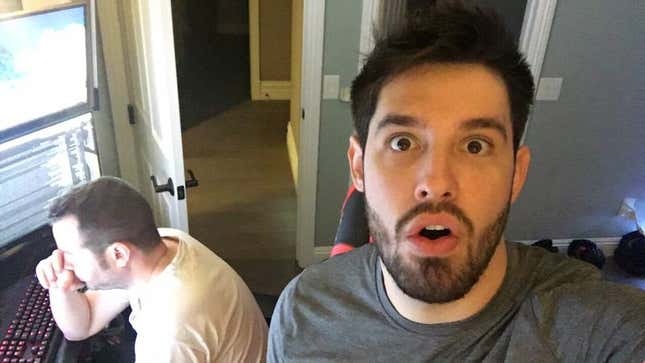
IIJERiiCHOII, whose real name is Tucker Boner (yes, really), has nearly 900,000 followers on Twitch and 1.2 million subscribers on YouTube. In 2015, Jericho joined Bain in shunning and criticizing G2A.
“Key resellers are very rarely fun to work with,” said Jericho in an interview with me recently. “Most people knew or at least were pretty sure of G2A and other key sellers’ involvement with fraud/illegal keys, etc.”
Jericho says G2A still reaches out several times a month, asking if he would like to join again. And though he won’t work with G2A, he doesn’t blame people looking for cheap games.
“I mean, their success is because they are a platform where you never pay full price for a game or keys,” he said. “It’s filling a space where there was demand. I don’t think that key reselling is inherently bad, nor do I think that all key selling sites are bad. That said, G2A and other notable sites have done a good job to tarnish the rest of them, and while I agree that promotion from top personalities helped growth, there’s really nothing to blame them for. G2A gave me a bad vibe.”
MrMattyPlays, a YouTube creator with nearly 300,000 subscribers, dropped G2A as a sponsor in late June “because of the negative association,” as his channel focuses on a “love for games.”
“When I have a sponsor that is being accused and essentially proven of hurting developers; that contradicts what I believe in,” he said. “ [...] It was very hard to walk away from G2A. They were easy to work with, paid me well for 10 five-second promotions a month, and removed a lot of financial concerns in my life. The deal allowed me to experiment more on my YouTube channel because I was receiving revenue from another source which was also quite liberating.”
Even after G2A rolled out some of their changes, he still walked away. It wasn’t enough.
MrMattyPlays says he gets “thousands of dollars worth of offers each month” but passes on most opportunities. Viewers are conceptually skeptical of promotions, so he chooses partners carefully.
“For me, when I actually go through with a paid promotion,” he said, “it is only because I can legitimately get behind that product I’m talking about or it’s something I know that my audience will appreciate.”
For G2A, the company says all of this is merely “feedback that makes us stronger and better.”